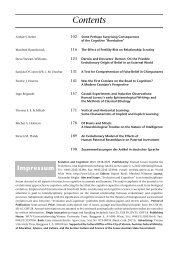The Seven Sins of Evolutionary Psychology - Konrad Lorenz Institute
The Seven Sins of Evolutionary Psychology - Konrad Lorenz Institute
The Seven Sins of Evolutionary Psychology - Konrad Lorenz Institute
You also want an ePaper? Increase the reach of your titles
YUMPU automatically turns print PDFs into web optimized ePapers that Google loves.
Jaak Panksepp and Jules B. Pankseppand other external practices) exhibited a high environmentalloading. <strong>The</strong> two forms <strong>of</strong> religiousnesswere inversely correlated—probably not surprisingfor many evolutionists who understand the utility <strong>of</strong>deception and the probable importance <strong>of</strong> corticalprocesses in generating such tendencies. Also, intrinsicreligiosity was positively related to authoritarianism(BOUCHARD et al. 1999). A liberal collegeeducation had a small effect on dampening that oldtime prophet instinct (i.e., a temporary nurture effect),but at eight years past those liberating collegedays, the old ways were—hang on <strong>Evolutionary</strong> <strong>Psychology</strong>fans—coming back with a vengeance, especiallyif you had lots <strong>of</strong> kids (personal communicationwith J.P.). Once again kids force us back to ourgenetic roots. Clearly, practically any human or animaltrait can be amplified or diminished genetically.However, in the past we rarely knew what was reallyselected, but the new molecular biology will soonchange that.Politics and TribalismAn enormous amount <strong>of</strong> ink and mental energy waswasted during the sociobiology wars because <strong>of</strong> thepolitical inclinations <strong>of</strong> certain participants (SEGER-STRÅLE 2000). We cannot easily escape our politicalbiases, but intellectual and social disasters can easilybe made if we do not own up to our ‘mere beliefs’.For this reason, we especially appreciate SEGER-STRÅLE’s participation in these discussions. Forinstance, the harsh treatment <strong>of</strong> the role <strong>of</strong> genes inour destinies at the hands <strong>of</strong> politically motivatedMARXISTS is a story that presently has only been halftold (hopefully, some forthcoming memoirs will setthe records straighter). We are the kind <strong>of</strong> speciesthat can perform intellectual, emotional and bodilymonstrosities in behalf <strong>of</strong> what we deeply believe(PETERSON 1999). All too easily, we develop tribalaffiliations which color all our subsequent beliefsand arguments. None <strong>of</strong> us are immune to suchissues, but they are <strong>of</strong>ten very apparent when wecome to issues as contentious as sociobiology and<strong>Evolutionary</strong> <strong>Psychology</strong> (LEWONTIN 1993).Probably most who read journals such as this arewell sensitized (or habituated) to those aspects <strong>of</strong>the human spirit, but the present debate has certainlynot been absent <strong>of</strong> those features. Let us be sobold as to highlight a striking instance that we couldnot avoid noticing. Our harshest critic in these discussions,PITCHFORD, asserts that “Neuroevolutionarypsychobiology’s reassignment <strong>of</strong> the tabula rasato the neocortex revivifies CARTESIAN dualism andrepresents a desperate strategy likely to be extremelydeleterious to scientific investigation. <strong>Evolutionary</strong>psychology should reject this approach…”To some extent, this assertion is notsimply a cold-headed response to the strengths andweaknesses <strong>of</strong> existing data and arguments, but alsoan indication <strong>of</strong> tribal affiliation, since he is a ‘listmaster’ for the extended evolutionary psychologycommunity. In personal communications, PITCH-FORD was kind enough to say, upon first reading ourarticle, that “although I disagree with a few <strong>of</strong> thedetails I do agree with broad thrust <strong>of</strong> the piece. Inmy view EP has made a number <strong>of</strong> fundamentalerrors: (1) by adopting the method <strong>of</strong> reverse engineeringin place <strong>of</strong> a consideration <strong>of</strong> phylogeny (2)by adopting functionalism, or the study <strong>of</strong> substrateneutral processes, in preference to the study <strong>of</strong> neurobehaviouraland neuropsychological homologies,(3) by adopting a commitment to the notion<strong>of</strong> the monomorphic mind, thereby excluding aconsideration <strong>of</strong> both polyphenism and adaptivegenetic variation as studied by game theorists, and(4) by adopting genic selectionism in preference todevelopmental systems theory. I think the issue <strong>of</strong>domain-specific versus domain-general mechanismsis <strong>of</strong> less importance than these four mainissues, as the brain surely contains both, and theirrelative contributions to our cognitive–emotionalcapacities is an empirical matter” (personal communicationwith J.P., 1/3/01).<strong>The</strong>n, four months later, after one <strong>of</strong> us (J.P.) hadshared some surprise about the throttling he hadprovided, PITCHFORD wrote back that “In my viewyour perspective embraces almost every issue <strong>of</strong> importance.<strong>The</strong> commentary does concentrate on areas<strong>of</strong> disagreement, but had the word limit allowedI would have had much more to say about affectiveneuroscience as the essential foundation for evolutionarypsychology. <strong>The</strong> emphasis on functionalismthat evolutionary psychology has adopted from cognitivescience can result in a neglect <strong>of</strong> cross-speciescomparisons, and in a reluctance to embrace importantbranches <strong>of</strong> evolutionary biology such as ecologyand game theory. This can make it seem abiologicalat times, but I see this as an unwelcome tendencyrather than a defining trait. However, most <strong>of</strong> thefaults you identify in ‘seven sins’ can be found in thework <strong>of</strong> evolutionary psychologists” (personal communicationwith J.P., 4/23/01). We do not share suchpersonal communications with any desire to embarrass(indeed we agree completely with the gist <strong>of</strong>those arguments), but they do highlight that in ourhuman (male?) eagerness to put forward strongEvolution and Cognition ❘ 76 ❘ 2001, Vol. 7, No. 1








